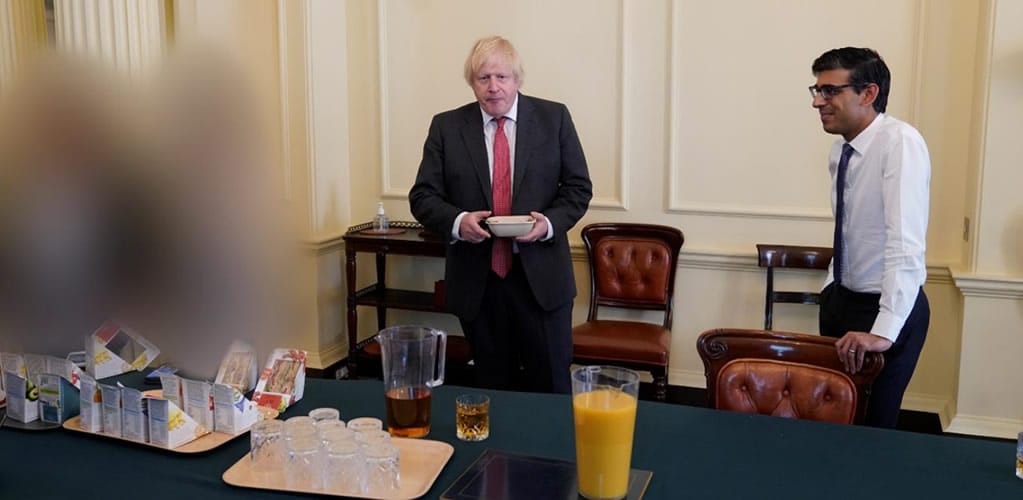Partygate: How the Sue Gray report revealed the age of ‘government by WhatsApp’.
The report on lockdown parties at Number 10 relied heavily on WhatsApp transcripts to show wrongdoing. But WhatsApp should not be used to make detailed decisions in government, to begin with.

The report on lockdown parties at Number 10 relied heavily on WhatsApp transcripts to show wrongdoing. But WhatsApp should not be used to make detailed decisions in government, to begin with.
First published: May 2022.
One of the striking things about civil servant Sue Gray’s report on lockdown parties at 10 Downing Street – aside from the alcohol consumption, vomiting and karaoke singing – was the presence of multiple WhatsApp transcripts.
Exchanges between staff showed them planning parties and openly admitting that they knew what they were doing wasn’t right. In one exchange that will surely become emblematic of the whole debacle, Martin Reynolds, a close aide to prime minister Boris Johnson at the time, speaks of having “got away” with a party during lockdown without the press catching wind of it.
Another message from a different member of staff is equally damning:
Inquiries into wrongdoing by government have long made extensive use of official records – but traditionally they were paper-based. Histories written years later have then made use of the “weeded” files in the National Archives to reconstruct those same events. These are often littered with redactions masking sensitive material.
Gray’s report turns this practice on it head. Private messages between those at the heart of Number 10 became the basis of her evidence. These messages showed an unvarnished take on what was said within Number 10, rather than the sanitised script of an official minute. And these messages are potentially more useful to us in understanding the dynamics between those who govern our lives – as well as how they make decisions about official matters.
Some prospered during the pandemic & claimed hundreds of millions of pounds from the government’s furlough scheme. PMP received nothing. Help us as we crowdfund to make sure we continue beyond 1 July.
Please CHIP IN to keep us going!If important conversations are happening over rapid messaging and group chats – as the Gray report suggests – then that places an additional importance on being able to capture and record them. And let’s be clear, we now understand that party planning, in the context of partygate, is indeed a very serious matter. It’s also clear that WhatsApp is being used for other business in government too.

A WhatsApp exchange showing Downing Street staff debating how to hold a party in lockdown. | UK Government/Sue Gray Report
The prime minister’s former adviser, Dominic Cummings, produced a flurry of WhatsApp messages after his departure from government that demonstrated the fluid dynamics of the official response to COVID that was played out on this app.
Other ministers and backbenchers have provided a steady stream of WhatsApp message screengrabs that show flavours of behind-the-scenes debates, and the importance of being in one group over another. The culture secretary, Nadine Dorries, was said to have been ejected from the European Research Group’s WhatsApp group for having defended the prime minister too readily. WhatsApp messaging has replaced tea-room gossip as the common language of Westminster life.
Where is the transparency?
Digital archive trails (although many of the partygate protagonists did not realise this was what they were creating) have been with us since the inquiries into the Iraq War. At a seminar held at defence thinktank RUSI after the publication of the Butler Inquiry in 2004, a defence intelligence official said he routinely printed off all his email traffic “for the next inquiry”.
I suspect he was a rare case that understood before many others that email traffic would replace official memos as the currency of judicial and parliamentary investigations. Would the officials involved in partygate have been so free and easy with their words had they considered their texts as official memoranda? It seems unlikely.

A selection of WhatsApp messages are reproduced in Sue Gray’s report. | UK Government/Sue Gray Report
A huge part of the problem with WhatsApp being used for important business is how easy it is to delete your records, and how the end-to-end encryption that means only the sending and receiving accounts can access the messages is used to avoid scrutiny. In the High Court in March 2022, privacy campaigners accused the government of “governing via WhatsApp” and complained that democratic accountability was being undermined by the practice.
They said decisions were being made via personal WhatsApp message strings, some of which auto-deleted after only seven days. The Institute for Government has subsequently recommended that WhatsApp should not be used to make detailed decisions in government. Where it is used, messages should be retained “for the long term”.
No billionaire owner. No wealthy shareholders. PMP only exists thanks to our readers’ donations. We need your support today to keep us going.
CHIP IN or DONATE REGULARLYDelete, delete, delete!
The rules around the use of WhatsApp in government are not particularly vague – the presumption is against its use. What are vague are the rules around ensuring messages are appropriately captured for official records and stored.
One of the lessons of partygate is that an unequal system is emerging from this grey area. Relatively junior people have seen their messages being made public. In other cases, more senior people have escaped full scrutiny merely by virtue of remembering to clear their messaging history – or at least claiming that their messages magically disappeared.
On the other hand, it’s easy to take a screenshot and leak an exchange to the media. Officials have become trapped by the need to use these informal networks to get on and even get ahead, but run the risk of their real, unfiltered selves being exposed to the public. This was very rarely the case prior to the advent of WhatsApp when emails and memos were clearly marked with a security classification to remind the sender of the discoverability of the message.
The transition to a digital era of government is illuminated by Sue Gray’s report. The culture of politics exists in closed message groups and the business of government is increasingly conducted via these channels. If there is to continue to be meaningful oversight over government these messages will need to be archived and be discoverable to future investigators. This also means that officials will need to return to writing messages with sober caution and with an eye on how their future discovery with be treated by the public.

GOING FURTHER:
- Senior leadership must bear responsibility – Sue Gray | PMP Magazine
- Sue Gray report – Why hasn’t Boris Johnson resigned? | PMP Magazine
- ‘Wine time Friday’ and invites for 200 – Five of the most interesting findings from Sue Gray’s partygate report | PMP Magazine
- Boris Johnson: Why not taking responsibility degrades politics | PMP Magazine
— AUTHOR —
▫ Professor Robert M. Dover, Professor of Intelligence and National Security, University of Hull.
Sources
- Text: This piece was originally published in The Conversation and re-published in PMP Magazine on 29 May 2022. | The author writes in a personal capacity.
- Cover: Sue Gray Report. (Licensed under a Creative Commons Attribution-ShareAlike 4.0 International License.)







[Read our Comments Guidelines]